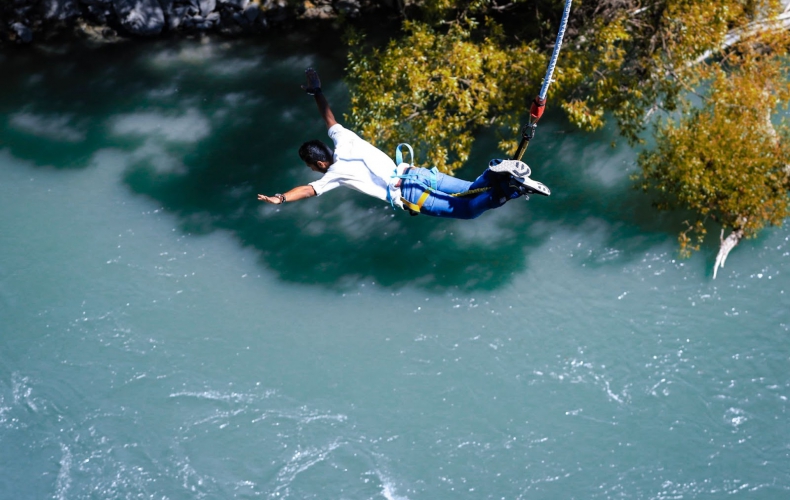Who is Liable in a Bungee Jumping Accident?

Bungee jumping is a thrilling activity that can provide an adrenaline rush like no other. But, before you take the plunge as a bungee jumping business owner, it’s essential to understand who is liable if an accident occurs.
Unfortunately, bungee jumping accidents happen. You need to be prepared to deal with the legal ramifications if they do. This blog post looks at potential bungee jumping accidents, who is responsible, and how a liability waiver may help protect your business.
How Common are Bungee Jumping Injuries?
Bungee jumping is an extreme sport that has become increasingly popular. While the adrenaline rush of leaping off a bridge or platform can be exhilarating, it is crucial to be aware of the risks.
Bungee jumping injuries are relatively rare, but they can occur. Most incidents are minor, such as bruises or scrapes. Still, more severe injuries, such as broken bones or concussions, are a possibility. To help reduce the risk of injury, many bungee jumping operators require participants to sign a liability waiver.
What are Common Accident Factors?
Common bungee jumping accidentss usually involve user error. Often, people don’t follow the safety guidelines provided by the bungee operator. For example, many operators require jumpers to read and sign a waiver of liability before participating in the activity.
However, some jumpers forego this step and do not read the waiver thoroughly. As a result, they may be unaware of the risks involved in bungee jumping.
Finally, the weather can also be a factor in bungee jumping accidents. Weather can be unpredictable and if the wind is too strong or the cord is wet, it can snap unexpectedly, leading to disastrous results.
In short, many factors can contribute to a bungee jumping accident. However, most of these accidents are preventable if jumpers take the time to follow the safety guidelines set forth by their chosen operator.
How Can You Minimize Your Risk?
You can do several things as a bungee jumping operator to minimize your risk of being sued. First, make sure you have a waiver of liability in place. Bungee jumping is an increasingly popular extreme sport, but it comes with significant risks.
For bungee jumping operators, it is essential to minimize this risk as much as possible. One way to do this is to require all participants to sign a waiver of liability. This waiver should clarify that the participant is aware of the risks involved in bungee jumping and that they agree to accept responsibility for any injuries or damages that may occur.
Second, educate yourself on the proper procedures for safely conducting a bungee jumping excursion. Many resources can help you understand the risks involved in bungee jumping and how to avoid them best.
Finally, familiarize yourself with the local weather before allowing participants to jump. If the weather is unfavorable, it could create dangerous conditions that put jumpers at risk.
Who is Responsible for the Accident?
While it can be an exhilarating experience, bungee jumping comes with inherent risks. Who is responsible for bungee jumping accidents? Most bungee jumping operators require participants to sign a liability waiver before jumping, which typically releases the operator from responsibility.
However, suppose the operator did not take proper safety precautions, or they did not properly inspect the equipment. In that case, courts may hold the operator liable. Ultimately, bungee jumping operators need to take all necessary safety precautions to minimize the risk of accidents.
With that said, participants also need to be aware of the risks involved in bungee jumping. By signing a waiver, participants agree to accept responsibility for any injuries or damages that may occur. Participants should make sure they are familiar with the safety procedures and inspect their equipment.
How can a Liability Waiver Help Protect Your Business?
If you own a bungee jumping business, requiring participants to sign a waiver of liability can help protect your business from lawsuits. Waivers are legal documents that state that the signer understands the risks involved in an activity and agrees to accept responsibility for any injuries or damages that may occur.
By requiring participants to sign a waiver, you can help to reduce your liability in the event of an accident. Having a waiver in place can help to prove that participants were aware of the risks involved in bungee jumping.
However, it is essential to note that waivers are not always legally binding. For a waiver to be enforceable, it must be clear and concise. The participant (or their parent or guardian) must sign the waiver if they are under 18 years old.
It is important to note that liability waivers will not protect your business from all liability. Thus, while a waiver can help reduce your liability, it is vital to take all necessary safety precautions to protect your business from lawsuits. Following these steps can help reduce your risk of being sued in an accident.
Looking for a done-for-you bungee jumping liability waiver template option? You can access our waiver of liability templates here.